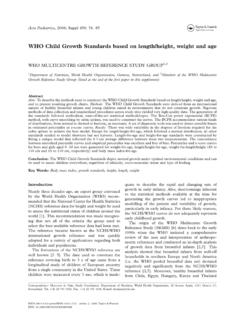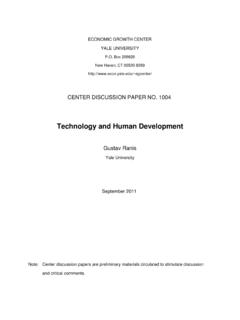Transcription of Economic Growth in Developing Countries: The Role of …
1 Economic Growth in Developing Countries: The Role of Human Capital Eric Hanushek Stanford University April 2013 Abstract The focus on human capital as a driver of Economic Growth for Developing countries has led to undue attention on school attainment. Developing countries have made considerable progress in closing the gap with developed countries in terms of school attainment, but recent research has underscored the importance of cognitive skills for Economic Growth . This result shifts attention to issues of school quality, and there Developing countries have been much less successful in closing the gaps with developed countries.
2 Without improving school quality, Developing countries will find it difficult to improve their long run Economic performance. JEL Classification: I2, O4, H4 Highlights: Improvements in long run Growth are closely related to the level of cognitive skills of the population. development policy has inappropriately emphasized school attainment as opposed to educational achievement, or cognitive skills. Developing countries, while improving in school attainment, have not improved in quality terms. School policy in Developing countries should consider enhancing both basic and advanced skills.
3 Keywords: Economic development , Economic impact, demand for schooling 2 Economic Growth in Developing Countries: The Role of Human Capital Eric Hanushek Stanford University The role of improved schooling has been a central part of the development strategies of most countries and of international organizations, and the data show significant improvements in school attainment across the Developing world in recent decades. The policy emphasis on schooling has mirrored the emphasis of research on the role of human capital in Growth and development . Yet, this emphasis has also become controversial because expansion of school attainment has not guaranteed improved Economic Moreover, there has been concern about the research base as questions have been raised about the interpretation of empirical Growth analyses.
4 It appears that both the policy questions and the research questions are closely related to the measurement of human capital with school attainment. Recent evidence on the role of cognitive skills in promoting Economic Growth provides an explanation for the uncertain influence of human capital on Growth . The impact of human capital becomes strong when the focus turns to the role of school quality. Cognitive skills of the population rather than mere school attainment are powerfully related to individual earnings, to the distribution of income, and most importantly to Economic Growth .
5 A change in focus to school quality does not by itself answer key questions about educational policy. Other topics of considerable current interest enter into the debates: should 1 See, for example, Easterly (2001) or Pritchett (2006). 3 policy focus on basic skills or the higher achievers? Also should Developing countries work to expand their higher education sector? The currently available research indicates that both basic skills and advanced skills are important, particularly for Developing countries.
6 At the same time, once consideration is made of cognitive skills, the variations in the amount of tertiary education have no discernible impact on Economic Growth for either developed or Developing countries. This paper puts the situation of Developing countries into the perspective of recent work on Economic Growth . When put in terms of cognitive skills, the data reveal much larger skill deficits in Developing countries than generally derived from just school enrollment and attainment. The magnitude of change needed makes clear that closing the Economic gap with developed countries will require major structural changes in schooling institutions.
7 The Measurement of Human Capital in Economic Growth In the late 1980s and early 1990s, empirical macroeconomists turned to attempts to explain differences in Growth rates around the world. Following the initial work of Barro (1991), hundreds of separate studies typically cross-sectional regressions pursued the question of what factors determined the very large observed differences. The widely different approaches tested a variety of Economic and political explanations, although the modeling invariably incorporated some measure of human capital.
8 The typical development is that Growth rates (g) are a direct function of human capital (H), a vector of other factors (X), and a stochastic element ( ) as in: (1) grHX 4 where r and are unknown parameters to be estimated. The related empirical analysis employs cross-country data in order to estimate the impact of the different factors on From a very early point, a number of reviews and critiques of empirical Growth modeling went to the interpretation of these studies. The critiques have focused on a variety of aspects of this work, including importantly the sensitivity of the analysis to the particular specification ( , Levine and Renelt (1992)).
9 They also emphasized basic identification issues and the endogeneity of many of the factors common to the modeling ( , Bils and Klenow (2000)). In both the analysis and the critiques, much of the attention focused on the form of the Growth model estimated including importantly the range of factors included and the possibility of omitted factors that would bias the results. Little attention was given to measurement issues surrounding human capital. This oversight in the analysis and modeling appears to be both explicable and unfortunate. A short review of the history of human capital modeling and measurement helps to explain the development of empirical Growth analysis.
10 Consideration of the importance of skills of the workforce has a long history in economics, and the history helps to explain a number of the issues that are pertinent to today s analysis of Economic Growth . Sir William Petty (1676 [1899]) assessed the economics of war and of immigration in terms of skills (and wages) of individuals. Adam Smith ([1776]1979) incorporated the ideas in the Wealth of Nations, although ideas of specialization of labor dominated the ideas about human capital. Alfred Marshall (1898), however, thought the concept lacked empirical usefulness, in part because of the severe measurement issues involved.









